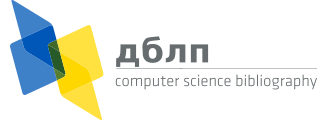

 Stop the war!
Stop the war! Остановите войну!
Остановите войну!
for scientists:


default search action
Prolog: The Next 50 Years, 2023
- David Scott Warren

 , Verónica Dahl
, Verónica Dahl , Thomas Eiter
, Thomas Eiter , Manuel V. Hermenegildo
, Manuel V. Hermenegildo , Robert A. Kowalski
, Robert A. Kowalski , Francesca Rossi
, Francesca Rossi :
:
Prolog: The Next 50 Years. Lecture Notes in Computer Science 13900, Springer 2023, ISBN 978-3-031-35253-9
Background
- David Scott Warren

 :
:
Introduction to Prolog. 3-19
About Prolog, Present and Future
- Manuel V. Hermenegildo, José F. Morales, Pedro López-García

 , Manuel Carro:
, Manuel Carro:
Types, Modes and so Much More - The Prolog Way. 23-37 - Michael R. Genesereth:

Prolog as a Knowledge Representation Language the Nature and Importance of Prolog. 38-47 - Gopal Gupta, Elmer Salazar, Farhad Shakerin, Joaquín Arias

 , Sarat Chandra Varanasi, Kinjal Basu, Huaduo Wang, Fang Li, Serdar Erbatur, Parth Padalkar, Abhiramon Rajasekharan, Yankai Zeng, Manuel Carro:
, Sarat Chandra Varanasi, Kinjal Basu, Huaduo Wang, Fang Li, Serdar Erbatur, Parth Padalkar, Abhiramon Rajasekharan, Yankai Zeng, Manuel Carro:
Prolog: Past, Present, and Future. 48-61 - David Scott Warren

 :
:
Writing Correct Prolog Programs. 62-70 - Nick Bassiliades

 , Ilias Sakellariou
, Ilias Sakellariou , Petros Kefalas
, Petros Kefalas :
:
Demonstrating Multiple Prolog Programming Techniques Through a Single Operation. 71-81 - David Scott Warren

 , Marc Denecker:
, Marc Denecker:
A Better Logical Semantics for Prolog. 82-92 - Carl Andersen, Theresa Swift:

The Janus System: A Bridge to New Prolog Applications. 93-104
Teaching Prolog
- Manuel V. Hermenegildo, José F. Morales, Pedro López-García

 :
:
Some Thoughts on How to Teach Prolog. 107-123 - Laurent Cervoni, Julien Brasseur, Jean Rohmer:

Simultaneously Teaching Mathematics and Prolog in School Curricula: A Mutual Benefit. 124-130 - Laura Andrea Cecchi

 , Jorge Pablo Rodríguez
, Jorge Pablo Rodríguez , Verónica Dahl
, Verónica Dahl :
:
Logic Programming at Elementary School: Why, What and How Should We Teach Logic Programming to Children? 131-143 - Veneta Tabakova-Komsalova

 , Stanimir Stoyanov
, Stanimir Stoyanov , Asya Stoyanova-Doycheva
, Asya Stoyanova-Doycheva , Lyubka Doukovska
, Lyubka Doukovska :
:
Prolog Education in Selected Secondary Schools in Bulgaria. 144-153 - Verónica Dahl

 , Laura Andrea Cecchi
, Laura Andrea Cecchi :
:
Introducing Prolog in Language-Informed Ways. 154-167
Tools for Teaching Prolog
- José F. Morales, Salvador Abreu

 , Daniela Ferreiro, Manuel V. Hermenegildo:
, Daniela Ferreiro, Manuel V. Hermenegildo:
Teaching Prolog with Active Logic Documents. 171-183 - Peter A. Flach

 , Kacper Sokol
, Kacper Sokol , Jan Wielemaker
, Jan Wielemaker :
:
Simply Logical - The First Three Decades. 184-193
Prolog-Based Languages and Systems
- Michael R. Genesereth:

Dynamic Logic Programming. 197-209 - Robert A. Kowalski, Fariba Sadri, Miguel Calejo, Jacinto A. Dávila

 :
:
Combining Logic Programming and Imperative Programming in LPS. 210-223 - Benjamin N. Grosof, Michael Kifer, Theresa Swift, Paul Fodor, Janine Bloomfield:

Ergo: A Quest for Declarativity in Logic Programming. 224-236
Prolog Applications: Finalists for the Colmerauer Prize
- Michael Leuschel

 :
:
ProB: Harnessing the Power of Prolog to Bring Formal Models and Mathematics to Life. 239-247 - Miguel Calejo, Charles Hoffman:

Pacioli: A PROLOG System for Financial Report Processing. 248-259 - Pierre Dissaux:

Logic Model Processing. 260-270 - Tristan Krueger, Abhijeet Mohapatra, Michael R. Genesereth:

Symbium: Using Logic Programming to Streamline Citizen-to-Government Interactions. 271-276 - Ken Satoh:

PROLEG: Practical Legal Reasoning System. 277-283
Contributed Prolog Applications
- Robert A. Kowalski, Jacinto A. Dávila

 , Galileo Sartor
, Galileo Sartor , Miguel Calejo:
, Miguel Calejo:
Logical English for Law and Education. 287-299 - Davide Ancona, Angelo Ferrando, Viviana Mascardi:

Exploiting Logic Programming for Runtime Verification: Current and Future Perspectives. 300-317 - Alessandro Dal Palù, Agostino Dovier, Andrea Formisano, Enrico Pontelli:

Prolog Meets Biology. 318-333 - Vesna Marinkovic

 :
:
Prolog in Automated Reasoning in Geometry. 334-345 - Gopal Gupta, Huaduo Wang, Kinjal Basu, Farhad Shakerin, Elmer Salazar, Sarat Chandra Varanasi, Parth Padalkar, Sopam Dasgupta:

Logic-Based Explainable and Incremental Machine Learning. 346-358 - Paul Tarau:

Reflections on Automation, Learnability and Expressiveness in Logic-Based Programming Languages. 359-371 - Jean-Christophe Rohner

 , Håkan Kjellerstrand
, Håkan Kjellerstrand :
:
Prolog for Scientific Explanation. 372-385 - Gregory Gelfond, Marcello Balduccini, David A. Ferrucci, Aditya Kalyanpur, Adam Lally:

Machines as Thought Partners: Reflections on 50 Years of Prolog. 386-392

manage site settings
To protect your privacy, all features that rely on external API calls from your browser are turned off by default. You need to opt-in for them to become active. All settings here will be stored as cookies with your web browser. For more information see our F.A.Q.

 Google
Google Google Scholar
Google Scholar Semantic Scholar
Semantic Scholar Internet Archive Scholar
Internet Archive Scholar CiteSeerX
CiteSeerX ORCID
ORCID















